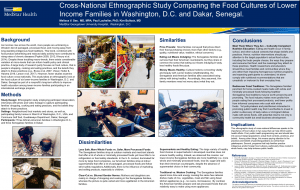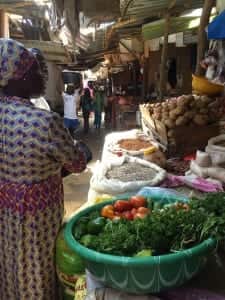Cross-National Food Culture Research Goes Public
Learning Life’s Director, Paul Lachelier, and Drs. Melissa See and Kim Bullock of the Georgetown University Medical Center’s Community Health Division co-presented key findings from a joint study of the food culture of lower-income families in Washington, DC and Dakar, Senegal on Monday and Tuesday this week.
 The cross-national research is intended to better understand the food culture (i.e., people’s shopping, cooking and eating practices, and the meanings they attach to those practices) of some of the families participating in Learning Life’s Citizen Diplomacy Initiative (CDI). “Since Learning Life launched CDI in summer 2016, we heard some of our DC participants express interest in learning about Africa given their own African origins, so it made sense to dig deeper into their food cultures” Lachelier explained. “Food culture is an accessible entry point into world affairs because not everyone may understand how world trade or the United Nations work, but everyone eats. Further, food culture varies by country, and can tell us a lot about not only about families and communities, but about the larger economic and political forces impacting their health.”
The cross-national research is intended to better understand the food culture (i.e., people’s shopping, cooking and eating practices, and the meanings they attach to those practices) of some of the families participating in Learning Life’s Citizen Diplomacy Initiative (CDI). “Since Learning Life launched CDI in summer 2016, we heard some of our DC participants express interest in learning about Africa given their own African origins, so it made sense to dig deeper into their food cultures” Lachelier explained. “Food culture is an accessible entry point into world affairs because not everyone may understand how world trade or the United Nations work, but everyone eats. Further, food culture varies by country, and can tell us a lot about not only about families and communities, but about the larger economic and political forces impacting their health.”
The multi-method study compared three lower-income families in Ward 8 of Washington DC with three lower-income families in the Guediawaye Department of Dakar. Combining interviews, participant observation and photo and video evidence, Dr. See spent several hours shopping, cooking and eating with each of the three DC families while Lachelier did the same with the Senegalese families in Dakar during February-April. They then compared their findings to produce a poster presentation (see actual poster image plus the full-text of the poster below) that was delivered at meetings of MedStar, a metro DC-Baltimore community health organization, and Unity Health Care, “DC’s largest network of community health centers” on April 30 and May 1. They will also present the poster at the Society of Teachers of Family Medicine annual conference on Tuesday, May 8 in Washington, DC.
“This research will help inform Learning Life’s work as we seek to improve the health of our CDI families in the long-term,” said  Lachelier. “Health is fundamental, and it’s under threat in many ways in lower-income communities. Working with partners like GUMC’s Community Health Division, we think we can improve our families’ health and citizenship in the long-term by working patiently with them on health-focused local-to-international projects.”
Lachelier. “Health is fundamental, and it’s under threat in many ways in lower-income communities. Working with partners like GUMC’s Community Health Division, we think we can improve our families’ health and citizenship in the long-term by working patiently with them on health-focused local-to-international projects.”
Read the full text of the poster below, with accompanying photos. For a free electronic copy of the actual poster, contact us at email@learninglife.info.
Cross-National Ethnographic Study Comparing the Food Cultures of Lower-Income Families in Washington, D.C., and Dakar, Senegal
Background
As incomes rise across the world, more people are embracing a Western diet of packaged, processed food, and moving away from long-standing indigenous food traditions. This trend, combined with food product advertising and reduced daily activity have contributed to rising rates of chronic diseases (Popkin 2009, 2012, Khoury et al. 2014). Despite these troubling macro-trends, there exists considerable variation at micro-levels that can inform health policy and clinical practice. A large body of research justly focuses on food culture, that is people’s shopping, cooking and eating practices, and the beliefs they attach to these practices (e.g., Bruss et al. 2007, Visser, Hutter & Haisma 2016, Larson et al. 2017). However, fewer studies examine food culture cross-nationally. This study takes an ethnographic look at the food culture of six lower-income families in Washington, D.C. and Dakar, Senegal as part of a nonprofit’s long-term efforts to improve health education among lower-income families participating in an international exchange program.


Methods
Settings: Neighborhood food markets and stores, as well as, participating family homes in Ward 8 of Washington, D.C., USA, and Commune Golf Sud, Guediawaye Department, Dakar, Senegal.
Participants: Three African-American families in Washington D.C., and three Senegalese families in Dakar.
Similarities
Price Prevails: Most families conveyed that prices direct their food purchasing choices more than other factors (e.g., quality, nutritional value, tradition, ethical concerns).
Eating Out Means Indulging: The Senegalese families eat out less than their American counterparts, but they share in common, the sense that eating out means indulging in tasty, less healthy foods like pizza.
Skinny Means Healthy: Cultural notions connecting vitality and beauty with curvier bodies notwithstanding, the Senegalese and American families alike associated being skinny with being healthy. Accordingly, they assumed, thin family members need not worry about what they eat.
Dissimilarities


Traditional vs. Modern Cooking: The Senegalese spend more time and energy cooking the same few national dishes made of rice, vegetables, meat and fish using fewer kitchen appliances (e.g., no ovens, microwaves). The Americans prepare and eat processed foods that are relatively easy to make using more appliances.
Supermarkets and Healthy Eating: The large variety of healthy foods in supermarkets in developed countries does not ensure healthy eating. Indeed, we observed the reverse: our lower-income Senegalese families ate more healthfully (i.e., more whole and minimally processed foods, less fat, sugar and salt) than their American counterparts, despite the absence of supermarkets in their community.
Clear-Cut vs. Blurred Gender Norms: Mothers and daughters are mainly in charge of shopping and cooking in the Senegalese families, whereas the picture is quite varied and more egalitarian in the American families.
Conclusions

 Meet Them Where They Are — Culturally Competent Nutrition Education: Eating and health occur in family, school and other cultural contexts that shape beliefs and practices. Hence, nutrition interventions should pay attention to the target population’s actual food culture, including the foods people choose, the ways they prepare and consume that food, and the meanings they attach to these practices. Health researchers and educators should thus meet families and communities where they are rather than imposing homogenous nutrition programs and expecting participants to understand, let alone comply with nutritional recommendations that are unrealistic or irrelevant to their everyday lives.
Meet Them Where They Are — Culturally Competent Nutrition Education: Eating and health occur in family, school and other cultural contexts that shape beliefs and practices. Hence, nutrition interventions should pay attention to the target population’s actual food culture, including the foods people choose, the ways they prepare and consume that food, and the meanings they attach to these practices. Health researchers and educators should thus meet families and communities where they are rather than imposing homogenous nutrition programs and expecting participants to understand, let alone comply with nutritional recommendations that are unrealistic or irrelevant to their everyday lives.
Rediscover Food Traditions: The Senegalese families’ penchant for home-cooked meals made with whole and minimally processed foods following healthier Senegalese food traditions may be worth preserving and promoting. The food industry makes more profits from people eating their processed products, and fewer profits from informed consumers who cook with whole foods. Yet policymakers and practitioners interested in promoting public health may find it worthwhile to invest in public re-discovery of tasty native or immigrant dishes made with whole foods, with potential returns not only to community health but small business development.
Implications
This ethnographic study of cross-national differences speaks to the importance of food culture in two ways that can help inform public health efforts. First, public health programming can and should take into account target populations’ actual food contexts, practices, and beliefs. Among other things, this means paying attention to the practices and beliefs of parents/guardians as central food gatekeepers. Second, programs that help families practice indigenous and/or foreign food cultures, particularly those rooted in whole foods, may help enhance public health.
References
Bruss MB, Applegate B, Quitugua J, Palacios RT, Morris JR. Ethnicity and diet of children: development of culturally sensitive measures. Health Educ Behav. 2007 Oct;34(5):735-47.
Khoury CK, Bjorkman AD, Dempewolf H, Ramirez-Villegas J, Guarino L, Jarvis A, Rieseberg LH, and Struik PC. Increasing Homogeneity in Global Food Supplies and the Implications for Food Security. Proceedings of the National Academy of Sciences 111:11:4001-4006.
Larson N, Miller JM, Eisenberg ME, Watts AW, Story M, Neumark-Sztainer D. Multicontextual correlates of energy-dense, nutrient-poor snack food consumption by adolescents. Appetite. 2017 May 1;112:23-34.
Popkin, BM. Global Changes in Diet and Activity Patterns as Drivers of the Nutrition Transition. Emerging Societies – Coexistence of Childhood Malnutrition and Obesity, ed. Kalhan SC. 2009;63:1-14.
Popkin, BM. The Changing Face of Global Diet and Nutrition Food Addiction: A Comprehensive Handbook, 2012. eds. Kelly D. Brownell and Mark S. Gold. Oxford: Oxford University Press.
Visser SS, Hutter I, Haisma H. Building a framework for theory-based ethnographies for studying intergenerational family food practices. Appetite. 2016 Feb 1;97:49-57.
Acknowledgements
The authors would like to thank the six participating American and Senegalese families for welcoming us into their homes and allowing us to break bread with their families. The authors would also like to thank Dr. Bullock for her guidance and support.

